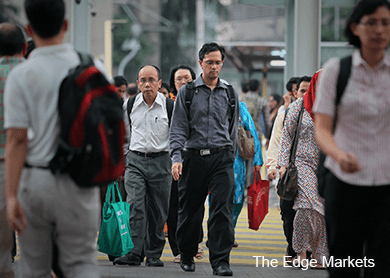
KUALA LUMPUR (Feb 10): Malaysian employees got better salary increases than their counterparts in Hong Kong and Singapore last year, according to the 2015 Hays Salary Asia Guide.
The survey noted that Malaysia saw some impressive salary increases as follows:
- 48% of employers gave pay increases of between 3% to 6%
- 31% of employers raised salary by between 6% to 10%
- 9% of employers raised salaries by more than 10%.
Only 3% of employers failed to give salary increases, while 9% offered a salary increase less than 3%, the survey of 2,361 employers representing 4.02 million employees conducted last year has found.
Hays Asia managing director Christine Wright said Malaysian job seekers also had great opportunities to secure jobs that offered career advancement or long-term career progression.
“By focusing on your long-term career objectives, rather than short-term financial benefits, the current market can provide the opportunities you need to get your career to where you ultimately want it to be,” she added.
In comparison, salary increases in Hong Kong and Singapore were more moderate, while employers in Japan continued to show restraint in increasing salaries.
Furthermore, Malaysian employees can also look forward to further salary increases as 47% of surveyed employers said they intend to raise salaries by between 3% to 6% at the next review, with 33% expecting to do so by 6% to 10%.
This was buoyed by employers’ positive sentiment towards the economic outlook in the near-term, the survey showed.
Twenty-seven percent of surveyed employers across Asia see a more positive economic outlook in the near-term, and 72% expect their level of business activity to increase in the year ahead, while 64% have already seen an increase in business activity in the 12 months prior to the survey.
“There will be little change to the extent of salary increases in the year ahead, with 41% of employers intending to increase staff salaries in their next review by 3% to 6%,” the report noted.
A further 22% will increase salaries by between 6% and 10%.
This resulted in salary increases on average across Asia, whereby 43% of surveyed employers increased salaries in their last review by 3% to 6% and a further 21% gave increases between 6% and 10%, while 8% increased above that level.
At the other end of the scale, 22% gave their staff increases of less than 3%, and the final 6% gave no increases at all.
The positive sentiment also underpinned the decision of 44% of employers surveyed to increase permanent staff levels in the past year, and 48% expecting permanent headcount to rise in the year ahead.
Country-by-country, the survey noted that China stood out with 50% of employers increasing salaries in their last review by between 6% and 10%, and a further 16% raising them above that level.
“Looking ahead, employers will be slightly more generous, with a significant 20% intending to give increases of more than 10%,” the report noted.
However, the report noted China also skimped the most on benefits for employees, with only half of surveyed employers granting health benefits.
The survey also noted that almost half of employers across Asia believed that the lack of skilled workers potentially hampered operations of their businesses, and more than half of them were open to employing qualified expatriates and contract workers to fill the gap, a survey revealed.
Another 65% of employers said they would consider employing or sponsoring qualified overseas or expatriate candidates in skill-short areas.
The survey found that the most difficult professionals to recruit were senior management candidates in sales (18%), accountancy and finance (13%), engineering (13%), marketing (12%), operations (11%) and human resources (10%).
Wright said the recent figures highlighted the need for employers to continue innovating to attract candidates in tight labour markets.
“This is especially important since 48% of employers told us they expect their permanent staff levels to increase in the year ahead and 72% expect their level of business activity to increase,” she said in a statement.
“With hiring plans remaining strong in most sectors and industries, more pressure will be added to the tight talent market to produce the highly-skilled local professionals that employers need,” she added.
The report noted that the demand for highly-skilled professionals is a factor for 54% of employers utilising a flexible staffing approach in the last year.
The most popular approach was the use of temporary or contract staff through a recruitment consultancy and over one quarter (26%) of employers now employ temporary or contract staff on a regular, on-going basis.
The report noted skills shortage was probably a contributing reason to increasing overtime and work hours in 31% of organisations.
Despite this, employers said a positive outlook on the economy gave cause for salary increases to be awarded to employees.